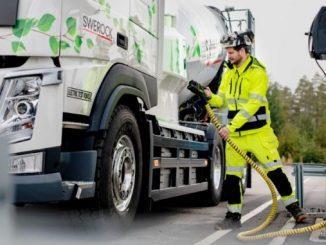
Daimler Truck revealed its plans for an independent future at a press conference last month as it heads towards separation from its parent company and stock market listing by the end of the year.
In addition to a radical financial shake-up, the company unveiled more plans for its electric future with technology partnerships announced for advanced battery development, as well as high-speed charging and hydrogen fuelling infrastructures.
While the company enjoys a 40% market share in North America, chief executive Martin Daum warned: “We will reset profitability. Every region must deliver competitive performance and we are willing to implement the measures necessary to achieve this goal. We are willing to take hard decisions to lower our break-even and raise our performance."
The company will aim for an overall double-digit return of sales by 2025, as well as reduce fixed costs, capital expenditure and R&D spending by 15% by 2025, compared with 2019. Fixed cost reductions will include reducing personnel costs by €300m by next year.
The company promised a stronger focus on the more profitable heavy-duty segment in its main regions. At the same time it plans to grow its aftermarket and services revenue, including financial services, from 30% currently towards 50% in 2030.
In the firing line are all internal combustion engines. Daimler will work with partners instead to provide engines, as it does currently with Cummins for medium duty trucks. The company will seek more partnerships for heavy duty engines, a radical shift for when it has previously always developed and produced its own engines. Spending on conventional powertrain will be progressively reduced with the vast majority redirected to zero-emission technologies by 2025.
Both battery electric and hydrogen fuel-cell electric trucks will replace conventional power. Although the company recently said it expects that fuel-cells will likely power long distance trucks, it will also launch a battery-powered eActros with 500km range in the next few years and aims for an 800km (500 mile) range capability for a battery powered vehicle.
Read more
- Daimler fuel cell trucks to hit the roads in 2021
- Daimler/Volvo fuel cell joint venture a giant leap towards electric future
- Daimler/Volvo joint venture reaches major milestone with launch of Daimler Truck Fuel Cell subsidiary
To reach its future drivetrain targets, Daimler Truck has announced a range of new and expanded partnerships to deal with the key issues. The company has expanded its current global partnership with CATL to supply batteries for the eActros truck, starting from 2024. The partnership will also produce truck batteries for Daimler Truck’s North American operations. The aim is to develop more advanced lithium-ion battery packs with high energy density and longer cycle life.
Battery-powered trucks are going to need more developed charging facilities than those being installed for electric cars. To address this, Daimler Truck has established a partnership with Siemens Smart Infrastructure, ENGIE and EVBox Group to deal with strategic charging infrastructure.
This is aimed at charging infrastructure solutions for depot charging systems for truck fleets, as Andreas von Wallfeld, head of marketing, sales and services at Mercedes-Benz Trucks, explains. The partnership has been set up, "in order to be able to assist our customers with all manner of questions concerning planning, application and implementation processes concerning charging infrastructure, as well as with connection to the electrical network”.
As reported recently, Daimler Truck and Volvo Truck laid out their plans for the cellcentric hydrogen fuel cell joint venture. While that addressed the production of fuel-cells to power trucks, it does not cover the necessary hydrogen fuelling infrastructure that is needed across Europe to re-fuel these vehicles in the future.
This will be the subject of another joint venture agreement that Daimler Truck has announced, this time with Shell New Energies of the Netherlands. Shell plans to roll out a hydrogen re-fuelling network to connect three hubs for the production of “green” hydrogen – produced from renewable energy sources. The hubs are located at the port of Rotterdam in the Netherlands, and Cologne and Hamburg in Germany. Shell’s aim is to open the fuelling stations between these locations from 2024. As previously reported in MT, Daimler Truck aims to hand over its first heavy-duty hydrogen fuel-cell trucks to customers in 2025.
Under the plan, the hydrogen freight corridor will be continuously expanded, with the aim of covering 1,200km by 2025. This should deliver 150 hydrogen re-fuelling stations and some 5,000 Mercedes-Benz heavy-duty fuel-cell powered trucks by 2030.
Daimler Truck and Shell are both members of the H2Accelerate consortium launched last December, which also includes IVECO, OMV and the Volvo Group. The consortium aims to expand the hydrogen fuelling infrastructure and stimulate production of fuel-cell powered trucks to reach 10,000 by 2030 in Europe.














